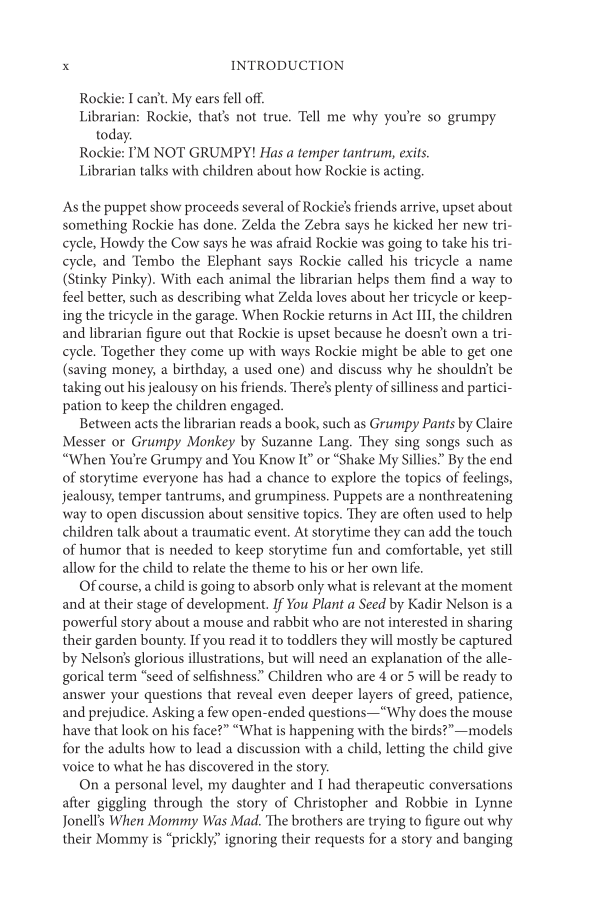x Introduction Rockie: I can’t. My ears fell off. Librarian: Rockie, that’s not true. Tell me why you’re so grumpy today. Rockie: I’M NOT GRUMPY! Has a temper tantrum, exits. Librarian talks with children about how Rockie is acting. As the puppet show proceeds several of Rockie’s friends arrive, upset about something Rockie has done. Zelda the Zebra says he kicked her new tri- cycle, Howdy the Cow says he was afraid Rockie was going to take his tri- cycle, and Tembo the Elephant says Rockie called his tricycle a name (Stinky Pinky). With each animal the librarian helps them find a way to feel better, such as describing what Zelda loves about her tricycle or keep- ing the tricycle in the garage. When Rockie returns in Act III, the children and librarian figure out that Rockie is upset because he doesn’t own a tri- cycle. Together they come up with ways Rockie might be able to get one (saving money, a birthday, a used one) and discuss why he shouldn’t be taking out his jealousy on his friends. There’s plenty of silliness and partici- pation to keep the children engaged. Between acts the librarian reads a book, such as Grumpy Pants by Claire Messer or Grumpy Monkey by Suzanne Lang. They sing songs such as “When You’re Grumpy and You Know It” or “Shake My Sillies.” By the end of storytime everyone has had a chance to explore the topics of feelings, jealousy, temper tantrums, and grumpiness. Puppets are a nonthreatening way to open discussion about sensitive topics. They are often used to help children talk about a traumatic event. At storytime they can add the touch of humor that is needed to keep storytime fun and comfortable, yet still allow for the child to relate the theme to his or her own life. Of course, a child is going to absorb only what is relevant at the moment and at their stage of development. If You Plant a Seed by Kadir Nelson is a powerful story about a mouse and rabbit who are not interested in sharing their garden bounty. If you read it to toddlers they will mostly be captured by Nelson’s glorious illustrations, but will need an explanation of the alle- gorical term “seed of selfishness.” Children who are 4 or 5 will be ready to answer your questions that reveal even deeper layers of greed, patience, and prejudice. Asking a few open-ended questions—“Why does the mouse have that look on his face?” “What is happening with the birds?”—models for the adults how to lead a discussion with a child, letting the child give voice to what he has discovered in the story. On a personal level, my daughter and I had therapeutic conversations after giggling through the story of Christopher and Robbie in Lynne Jonell’s When Mommy Was Mad. The brothers are trying to figure out why their Mommy is “prickly,” ignoring their requests for a story and banging
Document Details My Account Print multiple pages
Print
You have printed 0 times in the last 24 hours.
Your print count will reset on at .
You may print 0 more time(s) before then.
You may print a maximum of 0 pages at a time.







































































































































































































































